Table of Contents
Life of a Flight Nurse & Midwife
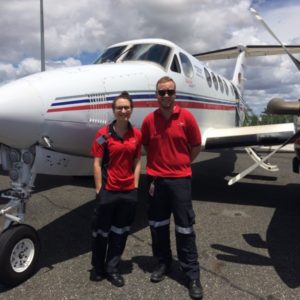
Tara (Wife) and I on our first day orientation to Rockhampton Base
Pleased to have Flight nurse and midwife Hayden Wilson share his experiences of working as health professional in the sky!
About Hayden
I am originally from a place called Norfolk Island. Many people haven’t heard of it, and that is possibly due to its small size (just 8 by 5 km’s). It a little slice of paradise in the Pacific Ocean, once a self-governed external territory of Australia. This is where I was born, and my passion for the medical industry began.
Hobbies!
Life as a Flight Nurse keeps me pretty busy, and with the arrival of our first daughter this year, my spare time is usually spent adoring her! I love to get to the ocean, be that a beach or coast drive it doesn’t really matter, anything to bring back memories of my island home will do. My other passion is cooking, and I love to entertain with a nice dinner at home or BBQ.
Why did you choose to be a nurse?
My path into nursing wasn’t a straight forward one. Originally, I wanted to join the Federal Police as a protective service agent. My first inkling that I might take more of a medical path, was during an advanced first aid course that I did with the Army Cadets in my early teens.
From there I started to volunteer with the local ambulance on Norfolk Island and did work experience at the local hospital as part of my senior studies. With my mum being a nurse on the Island I guess I took inspiration from her. I always thought I would go into Medicine, however, nursing got me hooked on its diversity and endless possibilities, so for me, it just fit.
Did you have a career before you started nursing?
I started my Diploma of Nursing fresh out of school as a baby faced 18-year-old. Prior to that, I had my fair share of jobs as a teenager including, washing dishes, cooking, cleaning rental cars, pumping petrol, video store attendant and even a brief acting stint for a local tourism company.
Where did you do your graduate program and what was it like?
Being an Endorsed Enrolled Nurse first, we weren’t offered graduate programs as such. I started out as an AIN in aged care and progressed to the Royal Brisbane and Women’s Hospital which little did I know at the time would be where I spent the next 8 years. As an EEN my first position was in an acute stroke/neurology unit, and I also attended to the neurology clinics on alternate weeks.
Once I was an RN there were limited positions in QLD at the time, and I stumbled into Pharmacology trials for a while. Eventually, I secured a graduate RN position at the RBWH in general medicine and rheumatology. It was very well supported and had a structured approach to ongoing learning, this is where built on my nursing skills and really solidified my tertiary theory.
Where did you study and when did you graduate?
I studied at the Queensland University of Technology and graduated my Bachelor of Nursing in 2012. I went on to complete my Graduate Certificate in Emergency Nursing there graduating in 2017. And then my Bachelor of Midwifery (Graduate Entry) at Central Queensland University graduating in 2019. Starting a Masters in Advanced Practice this year!
Where do you currently work?
I currently work in Rockhampton QLD for the Royal Flying Doctors Service (QLD Section) as a Flight Nurse and Midwife.
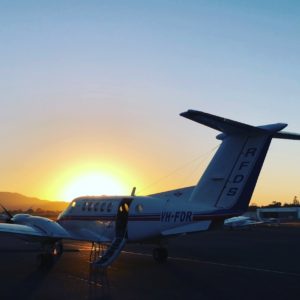
A gorgeous Rockhampton Sunrise on an early morning job.
What are the main types of patients you see in your current position and what is your role in their care?
There is no “main” type of patient that we see in our job. As a flight nurse, we are responsible for the care of almost every presentation you can think of across every speciality. No two jobs are ever the same, and that is probably the most interesting and captivating part of our job, as long as you don’t mind the unknown. From a newborn baby and mother to a critically injured ventilated patient or even an elderly patient that’s had a fall, we go to it all.
As an Emergency Nurse, I found my skillset very helpful for this given that the nature of the Emergency Department can be very similar. You learn to think on your feet fast and having a broad knowledge base prepares you well to do this.
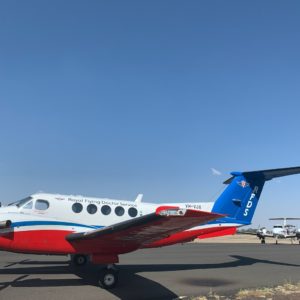
Meeting up with one of our clinic planes in Longreach QLD
What is an example of a ‘day in the life’?
A day in the life!
Well as I said before no two days are the same. At the Rockhampton Base, we run 3 shifts. 0600-1800, 0900-2100 and 1800-0600.
My morning typically starts at 0500 as we can be called for urgent jobs 1 hour before a shift, I like to be awake in case of that call rather than get a surprise. We attend the base and get a brief from the co-ordination centre at Retrieval Service Queensland (RSQ) as to what our first taskings will be. This is where we receive a brief clinical picture of the patient, where they are, where they are going and any particular requirements for staffing i.e whether a Doctor is needed.
The Pilot also receives this information with additional info for flight planning. From here the morning checks are done as you would in any hospital – counting of the schedule 8’s and checking equipment then packing the aircraft. Generally, we call the transferring facility for a handover and clarify any clinical needs. We then meet our patients at the tarmac (if their condition allows) with the local ambulance crew and get an additional handover. After loading we brief our patients on aircraft safety like you would in a commercial plane and set off.
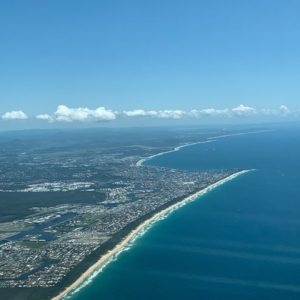
Trip to the Sunshine Coast 2020!
The care in the air is always at the same level or more that you would get in the hospital. So, if you need fluids you get fluids, intravenous antibiotics, monitoring of vital signs, blood tests etc we are fully equipped to cater for. From take-off anything can happen from there, diversion to higher priority taskings, cancellation of tasking, poor weather etc so we really have to be prepared for any eventuality.
All going well, we land at our destination, hand over to the ambulance for transfer to receiving facility, and we also provide a brief phone handover to the receiving facility to let them know the patient is on their way. Lunch, coffee, toilet stops etc fit in when and where we can, you soon learn that these need to be pre-planned!
What are some advice/thing’s nurses can do to better prepare themselves to get a job as a flight nurse?
Be a clinical sponge! Get as much experience as you can in different fields particularly ED/ICU or both and Birth Suite or Nursery is also extremely helpful for our day to day work. Don’t be afraid to step outside of your comfort zone to learn new things, and constantly challenge yourself. If there’s an area or skill your unfamiliar or uncomfortable with then seek out support to overcome that. For me that was Midwifery!
Never in 1000 years did I think I would do that, however, I knew I wanted to get into Flight Nursing – and so that was my challenge, and it was certainly a rewarding and enjoyable one.
Specifically, for RFDS (QLD) there is a thorough list of criteria needed to meet the challenges and variety of work we do.
1. Must be a Registered Nurse and Midwife with a minimum 3 years full-time equivalent in a critical care environment at either a Major Regional or Tertiary Hospital Emergency Department that has in department 24-hour medical coverage and recognised ICU. This time can be a mix of ED/ICU.
2. Have current Advanced Life Support (ALS), Paediatric Advanced Life Support (PALS) and Neonatal Resuscitation certification
3. Love flying, and don’t mind working in the confined environment of a small aircraft.
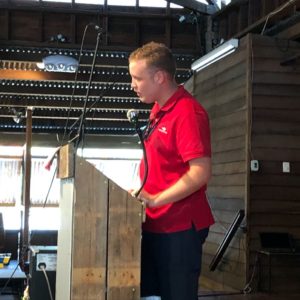
Part of our role is engaging with the local community and promoting our important work. Here accepting an amazing donation from the local Rockhampton Auxiliary.
Did you get any specific training/ what did that entail?
As a Flight Nurse we form part of the aircraft crew, so with the Pilot, we are responsible for the safety of our patients and passengers. As part of this, we undertake cabin safety training, how to exit the aircraft in an emergency and operate the exits, use the lifejackets including jumping in a pool fully clothed to test them. There are also specific and important changes that happen at altitude for our patients, so there are courses during our induction on aviation physiology and the physics associated with altitude.
Our training is extremely thorough and supported over a 4-week period where we fly with a senior flight nurse or educator to learn the intricacies of this unique position.
On top of this, we complete similar mandatory training as you would in a hospital environment on manual handling, infection control, child safety etc. Clinically RFDS also provides amazing opportunities to attend varying external courses as part of our ongoing credentialing including, pre-hospital trauma, trauma nursing course, obstetric emergencies course, midwifery upskilling programs, deteriorating patient programs and the RFDS run STAR program.
This all compliments a comprehensive in-house education calendar conducted by our nursing and medical education officers exploring different scenarios and trends in our fields. It’s certainly been the most education-focused position I’ve had to date, that really encourages individual learning and growth.
What are the most rewarding parts of your area of work?
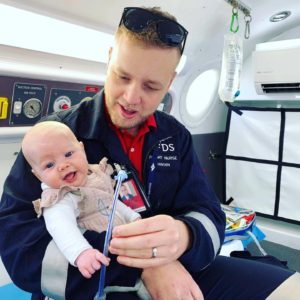
Starting young! Introducing my daughter to the importance of the advanced airway.
I think any nurse can agree, that the fact that everyday people place their trust and lives in us is the most rewarding aspect of our careers. Be that simply holding someone’s hand providing reassurance, through to caring for a complex critical care patient, nurses play such an integral part in our healthcare system.
I feel very privileged to be in such a trusted role. As a flight nurse flying out into small remote towns, the smile you see in people’s faces when we first arrive is something I will always remember.
Coming from a major quaternary teaching hospital it is certainly something I had always taken for granted (despite coming from a tiny island myself). Knowing that we are making such a big difference to rural and remote Queenslanders, literally providing them with a lifeline to tertiary level care would have to be the best part of my job. In saying that, I have to say it’s pretty cool that I have a flying office! The scenery never gets old.
What are the most difficult parts of your area of work?
The biggest challenge can sometimes be simply that we often pick up patients be it a critically ill ICU level patient, a sick child needing transfer for further care, a pregnant mother suffering complication of her pregnancy, and often that’s the last we hear. I always remember in Emergency if there was a particularly hard case, or you really wanted some follow up you could often easily find out how that person was going. Whilst we certainly can call into facilities and ask how someone is going, it’s certainly not as easy.
Another challenging aspect can be the isolation, you certainly get comfortable in the hospital setting knowing the red button on the wall will summon endless resources and assistance (in some settings). But in the air 70% of the time the flight nurse is it, and with that comes great clinical responsibility to act and respond accordingly to any and every clinical scenario that unfolds.
Whilst a challenge, I have found it really builds your confidence in your own skills and certainly adds a level of excitement to the job planning for the worst, hoping for the best and trusting your training and knowledge.
What do you carry on you during a shift?
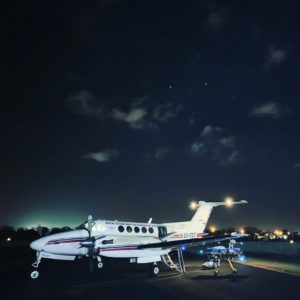
Unleashing my inner photographer waiting for an ambulance to transfer us to hospital.
As you can imagine we are pretty restricted as to what we carry in terms of weight. On myself I often have a couple of sets of gloves, multiple pens, stethoscope, set of trauma shears, ID, keys and if on night shifts a torch. In my backpack are my lunch, water bottle, sunscreen, deodorant, emergency toothbrush and toothpaste and emergency shirt and underwear (you never know if the weather will prevent your return home).
Also, in my pack is usually some pre-drawn IV flushes, emergency compression bandage and a Leatherman for the just in case scenarios. Every flight nurse is different, and everyone carries their own version of kit depending largely on advice and personal experience.
How do you destress after a shift and self-care?
I’m lucky enough to have married a nurse (who is also a Flight Nurse with RFDS!), so a lot of the time if needed I can come home and debrief. A really important tool to self-care is talking to someone about a tough case, not only to get it off your chest but also to rationalise the ‘what if we did this’ thought. I’ve lost count of the times that I’ve come home to my wife or spoken to colleagues at the end of a shift just to go through scenarios to often remind ourselves that we did everything we could.
Outside of that beach, beach, beach! Nothing more relaxing than laying on a beach with your favourite tunes or a good book and switching off. I’m also partial to a nice glass of red, or a Canadian club if it’s not a school night :).
What different areas of nursing have you worked in?
Like most of us, I started in aged care and an AIN while I studied, learning the fundamentals of what it is to care for someone. From there I went into neurology and stroke nursing for a couple of years before moving over to general medicine and endocrine. With a brief stint in clinical drug trials and after gaining my foundation I was looking for something more and thought I would use my neurology background and went into neurosurgical nursing including a high acuity post-operative bay. From there I went into Emergency and found my true passion area.
During my ED time, I did a short-term contract as a Nurse Educator for the hospital’s medical emergency portfolio before returning to the ED as an acting clinical nurse. With aeromedical retrievals always being my endpoint, I then completed my Midwifery studies which included rotations through antenatal care, special care nursery, birth suite, theatre, and the maternity wards which lead me to my dream job!
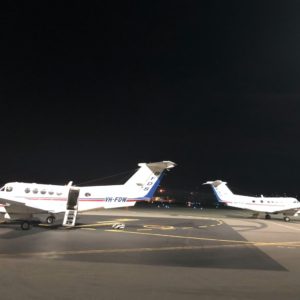
The ever changing office of a Flight Nurse
Can you share some night shift tips?
Rest, rest and more rest! We do 12-hour night shifts, and I have found the best combination for me (everyone is different) is 2-3 hours of sleep before the first shift if you can manage that. Come home wind down, have breakfast, empty the bladder and tuck in for another 6 hours. Then usually get about some chores, have a meal and generally do not too much then have another 2-3 hours sleep before the next.
Good food! Try to avoid the high sugar low reward snacks that often attract our attention at a moment of weakness at 3am, and drink lots of water. I’m also not a big fan of mid-shift naps on my break as I personally find I feel worse off for it. But again, everyone is different and if anyone has found the perfect cure, I’m all ears!
What would you do if you weren’t a nurse?
I’ve toyed with lots of ideas over the years, Police officer, Doctor, Paramedic or Military but all had a common theme, emergency service/helping others. Although I could see myself harnessing my love for cooking and becoming a chef! Do what you love and it’s not really work.
What’s in your lunch box!
Often last night’s leftovers, a muesli bar, assorted nuts or some kind of easy snack, and a couple of pieces of fruit. Never a sandwich! Soggy bread and I just don’t get along.
Can you think of a really funny situation you’ve had while nursing?
Probably my funniest and also most embarrassing story of my career goes back to my student days. Whilst in theatres as a student on the scrub/scout rotation I found myself thinking it was awfully cold at the end of a long orthopaedic case. I clearly remember the moment I said to the surgeon, “is it always this cold in here?” to which the Anaesthetist replied, “only when we drop our pants!”. To my horror, my scrub pants knot had come loose and they had promptly dropped to the floor. For the rest of practical I made extra sure my knots were tight.
What is one piece of advice for students you would give who are worried about starting a graduate year?
Make the most of it! Even if it isn’t what you thought you would be doing, take advantage of all there is to learn. Every experience in nursing is a learning one and it will shape you into a competent and efficient clinician if you soak up every opportunity offered to you.
Be open and honest with your mentors and help them to help you. If there’s a specific skill or knowledge gap you have – seek support. But be sure to give as much as you take, actively seek out information and learning and share with your peers if you stumble across something new and exciting.
A bloke who is also a nurse and midwife!? What was your experience as a male in nursing during your training and now as you work?
My experience overall has always been positive. You definitely come across the odd person here and there that makes a cheeky remark, or questions if it really a man’s job. My personal favourite is that we are medical students that didn’t make the cut! But in all honesty, it hasn’t been an issue, and I find both patients and other colleagues are respectful, and our gender really doesn’t play into it.
Midwifery was slightly different, and for many mostly understandable reasons. The journey a woman takes throughout her pregnancy, labour and birth is an incredibly special and intimate journey for her and her partner/child/family. As such, it can be confronting if a bearded man pops his head around the corner to say he’s your midwife for the shift. Why? Partially stereotype I guess, partially cultural, previous experience or personal beliefs.
Let me pose this, how many male obstetricians are questioned? At the end of the day, it’s about building a rapport with the woman and her family and gaining trust through mutual respect for each other and understanding the individual needs of the situation. There were occasions it simply wasn’t appropriate for a male midwife to attend, and if we have the ability to respect those wishes we absolutely should.
Where I undertook my training, I had the support of every midwife I worked with and I was encouraged to pursue the career. You could write a thesis on the topic I think but overall if you’re reading this and it’s something you’ve been thinking of doing please do!
What advice would you give to other men thinking of starting nursing?
Absolutely go for it! There aren’t many jobs in the world that allow you the versatility that nursing does. So many avenues for personal and professional growth, and to live through some incredible experiences. You can make the career what you want it to be, and honestly try a bit of everything until you find your niche. Whether you want to focus clinically and advance yourself that way as a clinical nurse, clinical nurse consultant or even nurse practitioner.
Education, management, public health, aeromedical, ships, private yachts, rural remotes, travel nurse, military, police, ambulance, fire the list goes on and on and on. So if you’re after a challenge, a rewarding career, and one that will never get old what are you waiting for?
Enrol now!
Thanks for reading!!
Check out other Flight Nursing Articles here
Check out Flight Nurses Australia website

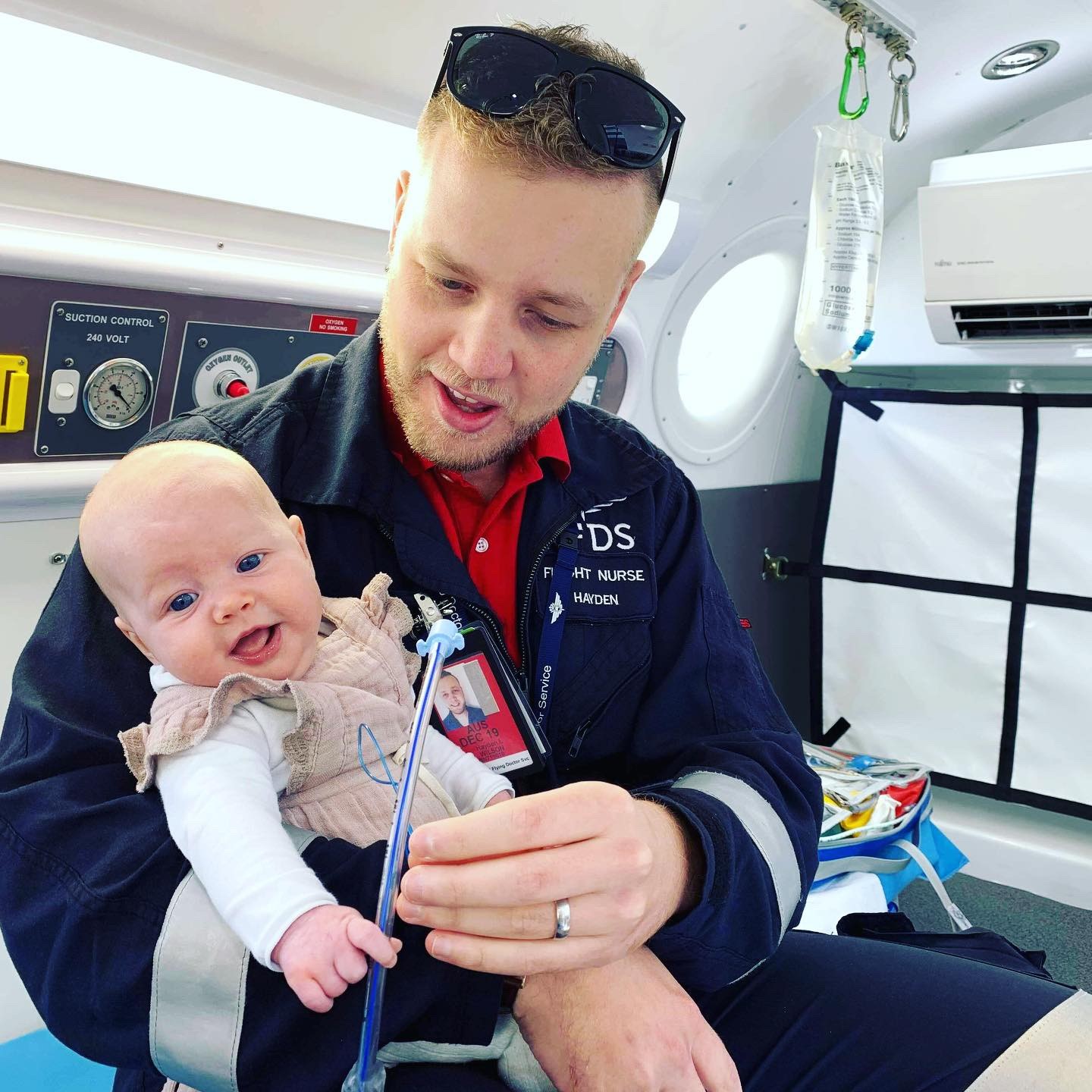




You must be logged in to post a comment.